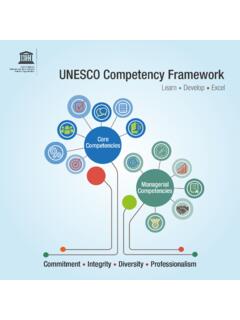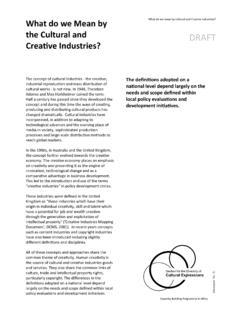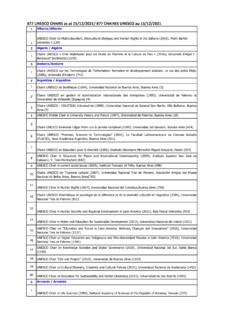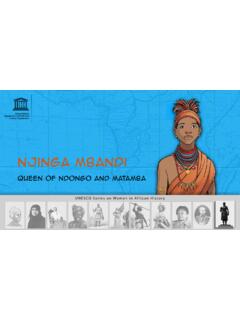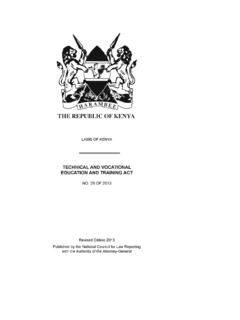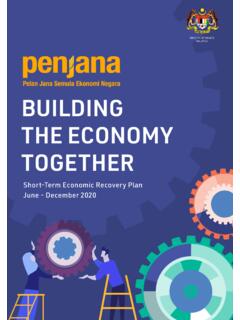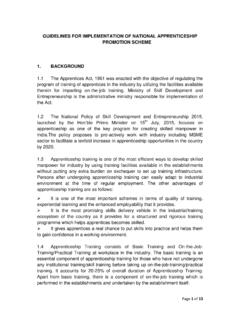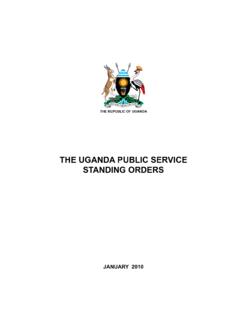Transcription of Technical Vocational and Education Training (TVET) 1
1 Technical Vocational and Education Training (TVET) 1 Technical Vocational and Education Training (TVET) i Contents Acknowledgements ii Executive Summary iii List of Abbreviations iv List of Tables vi List of Figures vii Introduction 1 Policy in TVET 1 Brunei Darussalam 2 Indonesia 2 Malaysia 4 Philippines 6 Timor-Leste 7 Objective 8 Methodology 8 Findings 10 Systematic Literature Review Findings 10 Accessibility 12 Skill Development 19 Equality 24 Empirical Findings 26 Brunei Darussalam 26 Malaysia 28 Philippines 32 Challenges in TVET implementation 36 Common Challenges 37 Unique Challenges 40 Recommendations 41 Recommendation 1: Ensuring Quality TVET programs 41 Recommendation 2: Enhance image of TVET as the educational choice 42 Recommendation 3: Ensuring 4IR skills in TVET programs 43 Recommendation 4: Embracing marginalized communities in TVET programs 43 Conclusion 43 References 44 Appendix 1 Survey Questionnaire 48 Appendix 2 Open-Ended Responses (Raw Data) 53 Technical Vocational and Education Training (TVET) ii Acknowledgements This Sub- Education Policy Review Report on Technical and Vocational Education Training (TVET) would not been possible without the kind and continuous support from the UNESCO Jakarta Office.
2 In the preparation of this report, we are highly indebted to the Education Director Generals, National Consultants, Technical Directors, Education Specialists, Policy Experts as well as other educational stakeholders from all the five cluster countries; Brunei Darussalam, Indonesia, Malaysia, Philippines, and Timor-Leste who were involved in data collection procedures in all five thematic areas. It is impossible to mention them here by name, but this report would not been possible without their cooperation and participation. I would also like to express my special gratitude and thanks to the Universiti Kebangsaan Malaysia team coordinated and led by Prof. Dr. Mohd Nizam Mohd Said, together with Prof. Dr. Kamisah Osman, Prof. Dr. Lilia Halim, Dr.
3 Lee Tien Tien and Mr. Azizi Alias for their continuous, conscientious and effective work through the whole period of this project. Their personal involvement and dedication were a precondition for completing this report in expected time and shape. Thank you very much. Dr Mee Young Choi Head of Education UNESCO Jakarta. Technical Vocational and Education Training (TVET) iii Executive Summary Technical and Vocational Education and Training (TVET) is an important part of the Education system with the aim of developing skilled workers for a country. For developing countries, including the member states of UNESCO Jakarta namely Brunei Darussalam, Indonesia, Malaysia, Philippines and Timor- Leste; consider TVET as the panacea for economic development and unemployment reduction.
4 SDG4 reinforces the role of TVET to ensure no one is left behind and at the same time contribute to the wellbeing of the nation. Such aspiration is met by providing accessibility of quality TVET Education to ALL through a) progressively providing free TVET Education and b) ensuring youths who are in the formal or out of the formal Education system gain current work-based competencies and the competencies needed in the future. Hence, in achieving SDG4, TVET is offered as a lifelong learning process. This report presents the Education policy review on TVET in relation to the key question: How TVET policy and interventions, of the five cluster countries, are able to meet and achieve SDG 4? This review draws upon UNESCO reports pertaining to TVET policies and initiatives. In addition, a systematic review of empirical studies on TVET (2016-2020) identified from related and major databases (SCOPUS, ERIC and WoS) is conducted.
5 In addition, empirical data was obtained from the implementers and policy makers through a survey questionnaire. The UNSECO reports, review of empirical studies and empirical data are analysed based on the SDG4 and its targets pertaining to TVET. The targets to be attained by 2030 focus on themes that aligns the objectives on TVET towards a) enhancing the participation rates of youth and adolescents in formal and non-formal Training , b) providing quality programmes for skills development that meet the industrial needs now and in the future where to some extend are able to create own jobs and c) enhancing the participation of ALL regardless of sex, age, persons with disabilities, indigenous peoples and children in vulnerable situations. The key findings from the review are 1) TVET policies are related to each country s national development goals with financing for TVET from various stakeholders, 2) the curriculum of TVET are practical oriented but also focusses on developing the soft skills needed for decent jobs and not only employment in the Technical fields, and 3) enhancing the Public and Private Partnership towards providing TVET that meets the industrial needs.
6 Each member state country has put in placed national accreditation for Technical Education and Vocational Training as a means to ensure that quality graduates of TVET are able to meet the industrial needs, obtain decent and create own jobs. Nevertheless, all five cluster countries, experienced challenges in implementing the policies that might hinder the acceleration in meeting SDG4 in relation to TVET. Common challenges revolve around mainly on lack of infrastructure, equipment and quality programs and instructors. TVET Education and TVET career has been shown to be the last choice for students. Skills identified for industry have not been addressed by the TVET programs to ensure capacity growth of youths to be ready for the industry. The review revealed an interesting trend in TVET implementation in the areas of its impacts, implementation status and constraints to the successful implementation.
7 TVET, in the Ministry of Higher Education (MOHE), could advocate a broad range of industry participation opportunities to encourage a range of manufacturers to be involved in preparing highly skilled workers for their industry. These will involve joint projects with Training institutions designed to prepare colleges and students with the most up-to - date knowledge and skills needed for global economy work. Given that there are gaps in current Technical skills with the Technical skills needed for IR , it is recommended that TVET institutions restructure the learning process of the software, getting to know network structures so as to master big data technologies. As a conclusion, TVET policies and interventions are put in place by all five countries, and it meets to some extent, the targets of SDG 4.
8 However, review have highlighted aspects of the policies and its initiatives that could be continuously improved. Another particular gap namely the inclusivity component of SDG4 namely embracing the marginalised communities for TVET, needs more attention either through more studies on the issue or developing TVET policies and initiatives addressing the equity issue, especially beyond COVID-19. Technical Vocational and Education Training (TVET) iv List of Abbreviations 11MP 11th Malaysian Development Plan ADB Asian Development Bank AEC ASEAN Economic Community ANAAA National Agency for Academic Assessment and Accreditation APACC Asia Pacific Accreditation and Certification Commission BDNAC Brunei Darussalam National Accreditation Agency BDTVEC Brunei Darussalam Technical and Vocational Education Council BLK National Training centres BPS Private Education Sector BPTV Bahagian Pendidikan Teknikal dan Vokasional CATs Competency Assessment Tools CBA Competency Based Assessment CEOPs Centres for Employment and Professional Guidance DA Department of Agriculture DILG Department of Interior and Local Government DIV Diploma IV DSD Department of Skills Development DSWD Department of Social Welfare and Development DTVE Directorate of Technical and Vocational
9 Education EAS TVET QAF East Asia Summit TVET Quality Assurance Framework EFA Education for All EICF Energy Industry Competency Framework EIDPMO Energy and Industry Department at the Prime Minister's Office EIQA Energy Industry Quality Assurance ETP Economic Transformation Program GAA General Appropriations Act GEM Global Statistics Entrepreneurship Monitor HEIs Higher Education Institutions HLIs higher learning institutes HRDC Human Resources Development Council HRDF Human Resources Development Fund HRMD-AS Human Resource Management Division Administrative Services IAC Industry Advisory Council INDMO National Institute for Labour Force Development Industrial Revolution ITIs Industrial Training Institutes JPTVET Technical and Vocational Education and Training Enhancement Committee KPIs Key Performance Indicators KSAP Knowledge, skills, abilities, and personalities KV Vocational College LGU Local Government Units LMICs low- and middle-income countries LMIS Labour Market Information System MARA Majlis Amanah Rakyat MBOT Malaysia Board of Technologists m-DPBL Multimedia in the Direct Problem-Based Learning MoE Ministry of Education MoE Ministry of Education MoEC Ministry of Education and Culture Technical Vocational and Education Training (TVET)
10 V MoH Ministry of Health MOHE Ministry of Higher Education MOHR Ministry of Human Resource MoMT Ministry of Manpower and Transmigration MoRTHE Ministry of Research Technology and Higher Education MQA Malaysian Qualification Agency MQF Malaysian Qualification Framework MSCS Malaysian Skills Certification System MTUN Community Colleges and Malaysian Technical University Network NEPU National Economic Planning Unit NESP National Education Strategic Plan NKEA National Key Economic Area NOSS National Occupational Skills Standards NQF National Qualification Framework NTTA National TVET Trainers Academy NVTC National Vocational Training Council OFWs Overseas Filipino workers PLPG Training of the Teachers PPG Teacher Professional Education PPP Public-Private-Partnerships PPPM Malaysia Education Blueprint PTCACS Philippine TVET Competency Assessment and Certification System PTTQF Philippine TVET Trainers Qualification Framework PWC Price Waterhouse Coopers RTOs Registered Training Organizations S1 Undergraduate Degree SDFC Skills Development Fund Corporation SEPFOPE Secretariat of State for Vocational Training and Employment Policy SKKNI Standar Kompetensi Kerja Nasional Indonesia SMI Small and Medium Industries SMK Revitalizing TVET SPN21 Sistem Pendidikan Negara Abad Ke-21 TAFE Technical and Further Education TESDA Technical Education and Skills Development Authority TM Trainers Methodology TRs Training Regulations TUK Tempat Uji Kompetensi TVET Technical and Vocational Education and Training TVIs Technical and Vocational Institutions TVL Technical Vocational Livelihood UNESCO United Nations Organisation for

